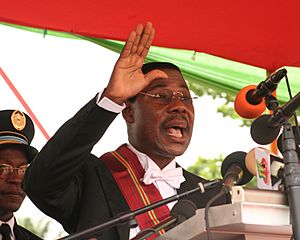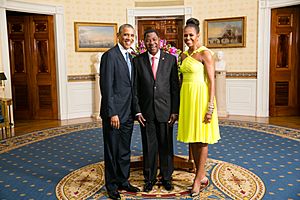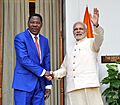Thomas Boni Yayi facts for kids
Quick facts for kids
Thomas Boni Yayi
|
|
|---|---|
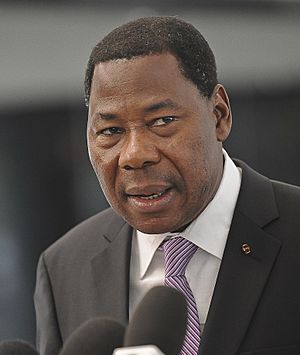
Boni in 2012
|
|
| 7th President of Benin | |
| In office 6 April 2006 – 6 April 2016 |
|
| Prime Minister | Pascal Koupaki Lionel Zinsou |
| Preceded by | Mathieu Kérékou |
| Succeeded by | Patrice Talon |
| 10th Chairperson of the African Union | |
| In office 29 January 2012 – 27 January 2013 |
|
| Preceded by | Teodoro Obiang Nguema Mbasogo |
| Succeeded by | Hailemariam Desalegn |
| President of The Democrats | |
| Assumed office 15 October 2023 |
|
| Preceded by | Eric Houndété |
| Personal details | |
| Born |
Thomas Yayi Boni
1 July 1951 Tchaourou, Dahomey (now Benin) |
| Political party | The Democrats (Since 2020) |
| Spouse | Chantal de Souza |
| Children | 5 |
| Relatives | Marcel Alain de Souza (brother-in-law) |
| Alma mater | National University of Benin Cheikh Anta Diop University University of Orléans Paris Dauphine University |
Thomas Boni Yayi, born on July 1, 1951, is a banker and politician from Benin. He served as the president of Benin from 2006 to 2016. He won the election in March 2006 and was re-elected for a second term in March 2011. He also led the African Union as its chairperson from January 29, 2012, to January 27, 2013.
Contents
Early Life and Education
Boni Yayi was born in Tchaourou, a town in northern Benin, which was then a French colony called Dahomey. He started his education in Parakou, the regional capital. Later, he earned a master's degree in economics from the National University of Benin.
He continued his studies abroad, getting another master's degree in economics from the Cheikh Anta Diop University in Dakar, Senegal. He then earned a doctorate in economics and politics from the University of Orléans in France. In 1976, he completed another doctorate in economics at Paris Dauphine University.
Banking Career
After finishing his education, Boni Yayi began a long career in banking. From 1975 to 1979, he worked at the Benin Commercial Bank. He then moved to the Central Bank of West African States (BCEAO), where he worked from 1977 to 1989.
From 1992 to 1994, he served as an economic adviser to the President of Benin, Nicéphore Soglo. In 1994, he became the President of the West African Development Bank (BOAD).
Presidency of Benin
In March 2006, Boni Yayi was one of 26 candidates running for president. He ran as an independent candidate and surprised many by winning 35.8% of the votes in the first round. His main goals were to improve how the government worked, help businesses grow, offer better education for women, and modernize farming.
His closest opponent was Adrien Houngbédji. In the final round of voting on March 19, 2006, Boni Yayi won with almost 75% of the votes. He officially became president on April 6, 2006. Many observers said the election was fair and had a high number of people voting.
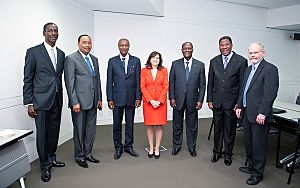
In the 2007 parliamentary elections, a group of parties supporting Boni Yayi, led by the Cowry Forces for an Emerging Benin (FCBE), won the most seats. However, this group later broke apart by 2010, which made it harder for Boni Yayi to pass his plans.
By August 2010, some members of parliament tried to remove Boni Yayi from office due to concerns about a financial program. They did not get enough votes to do so.
Re-election and Second Term
Before the 2011 presidential election, a new voter system caused some debate. With help from international groups, Boni Yayi agreed to delay the election by two weeks. International monitors said the election was fair, and Boni Yayi won in the first round with 53.8% of the votes.
His opponent, Houngbédji, challenged the results, but the Constitutional Court confirmed Boni Yayi as the winner on March 21, 2011. In the parliamentary elections that followed, Boni Yayi's supporting parties won 49 out of 83 seats. He is the only president in Benin's modern democracy to win the presidency in a single round of voting.
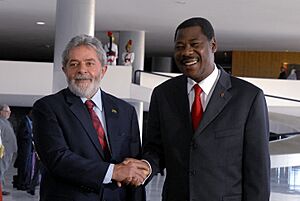
After serving two terms, Boni Yayi had to step down in 2016, as required by Benin's constitution. His chosen successor, Prime Minister Lionel Zinsou, lost the March 2016 presidential election to Patrice Talon. Boni Yayi was succeeded by Patrice Talon on April 6, 2016.
After leaving office, Boni Yayi led the African Union's team that observed the April 2016 presidential election in Equatorial Guinea. In September 2021, Boni Yayi met with President Patrice Talon in Cotonou. During their meeting, Boni Yayi shared ideas and requests, including asking for the release of people who were in jail for political reasons.
Personal Life
Boni Yayi was born into a Muslim family but later became an Evangelical Protestant. He has five children with his wife, Chantal (née de Souza). Chantal is from the coastal city of Ouidah and has family ties to important figures in Benin's history.
Boni Yayi is a descendant of the Yoruba princes of Sabe. In 2008, both he and his wife received special titles from the Nigerian king of Ile-Ife, Olubuse II.
Images for kids
-
Narendra Modi meeting Boni Yayi in New Delhi, October 2015
See also
 In Spanish: Yayi Boni para niños
In Spanish: Yayi Boni para niños


